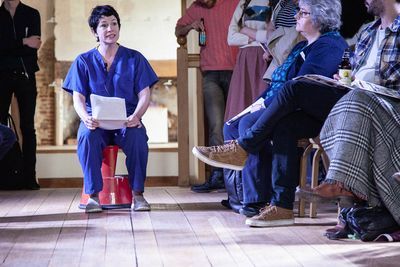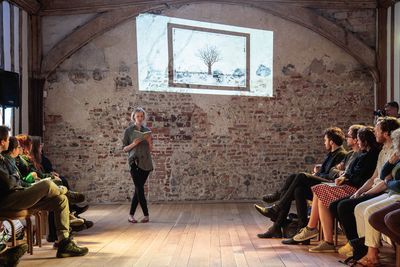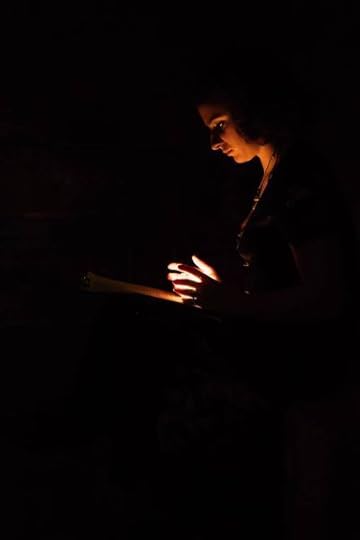The Story Machine: a multidimensional literary event

Sarah Hall reading "Theatre Six"; credit: Neeley and Matt Drown
By ALAN MURRIN
I climbed the stairs of Dragon Hall, home of Writers��� Centre Norwich, to the vaulted Great Hall of this fifteenth-century building, where an audience was waiting for a reading to begin. A woman in dungarees and a knotted headscarf emerged from the wings. She was, we soon learnt, the mechanic oiling the metaphorical cogs of The Story Machine ��� a multidimensional literary event directed by Sam Ruddock for this month���s Norwich and Norfolk Festival. It was her job to introduce us to the writer Sarah Hall, who ��� herself dressed in surgical scrubs ��� read her story ���Theatre Six���, a dystopian vision of healthcare in the near future, in which a doctor���s faith in her vocation is threatened by a new political world order. A woman then entered dragging a wicker mat with an alabaster leg lying on it. She was quoting lines by Carol Ann Duffy from the poems ���We Remember Your Childhood Well��� and ���Mrs Lazarus���. If I had followed her to the garden at the back of the building, I would have heard a story by Jarred McGinnis, the founder of the literary variety night The Special Relationship. In his story ���Charles III���, the Poet Laureate has been hung, drawn and quartered, and the limb that had just passed me represented her remains. . . .
It���s not always clear that arts festivals know what to do with literature other than the pleasant yet obvious things, like interviewing authors and hosting book signings. Joyous in tone, international in scope and direct in its confrontation with serious issues, The Story Machine offered something decidedly different, without any of the po-faced posturing that can sometimes make such events feel like a chore for all involved. (And its success, incidentally, hints at what Writers��� Centre Norwich could achieve if the funding targets for the next stage of its development are met. [http://www.writerscentrenorwich.org.uk/supportus.aspx]).
I decided to forgo the ritual dismemberment in the garden to attend another of eighteen delights on offer over the next three hours: ���Situations���, a collection of video essays produced by the writer Claudia Rankine and her husband, the filmmaker John Lucas. The films were based on Rankine���s award-winning collection of essays, vignettes and poetry, Citizen: An American lyric (reviewed in the TLS of September 18, 2015); and they focused on a shopping mall, a train, Hurricane Katrina and Zinedine Zidane���s infamous World Cup Final headbutt. The footage of Zidane was slowed down to such an extent that, even as the footballer squared up to his opponent, it seemed that the blow might never land. Each of the films dealt with issues of racial identity and prejudice, and Rankine���s words stuck in my mind after I had left the room: ��� . . . In a landscape drawn from an ocean bed, you can���t drive yourself sane ��� so angry you are crying. You can���t drive yourself sane . . . ���.
I made my way to the bar. There were six cocktails available, each relating to one of the events. I was about to attend a reading by Kevin Barry, so decided to have ���A Cruelty��� ��� a drink devised by the man himself and named after the story he would read later that afternoon in the garden. First, though, he was reading one called ���Roethke in the Bughouse���, in the Great Hall. This, we discovered, was about Theodore Roethke suffering a breakdown during a trip to the island of Inisbofin, and his subsequent treatment in a psychiatric hospital.
In the garden, lunch was being served. You could choose a story to be served with your vegetables and couscous: ���The Reader��� or ���The Writer��� by Etgar Keret, folded origami style. People had already begun to position themselves expectantly in the glass atrium beside the entrance to ���The Electrification Trilogy���, for which places were limited. Twelve of us were led underground. We descended a narrow staircase to a low-ceilinged cavern lit only by candlelight. Keret told us the tale of how his parents met, a serendipitous encounter that involved his father being arrested for pissing against the western wall of the French embassy in Tel Aviv. Next we were led to a lower room where an actor performed ���Electrification��� by the Soviet satirist Mikhail Zoshchenko. A married couple have electric light installed in their apartment, and it exposes the full extent of their poverty. With no money to improve their circumstances, the husband bemoans their fate: ���Light���s all very well, brothers, but it���s not easy to live with���. As we were led back into daylight, the trilogy ended with the sweet story of how Keret and his wife protected their son by playing a game that distracted him while they waited out an air-raid siren on the outskirts of Tel Aviv.
Everyone congregated in the Great Hall once more, for the final act. There was a simple and charming close to proceedings: Anna Metcalfe read her story ���Still���, with a drawing of a plum tree projected on to the wall behind her, changing as the story progressed. It was the story of a widowed man and his son who take a photograph of the same tree every year as the last leaf falls from its branches. And it was beautifully done. Other festival producers should take note.

Anna Metcalfe reading "Still"; credit: Neeley and Matt Drown
Peter Stothard's Blog
- Peter Stothard's profile
- 30 followers




